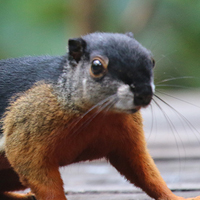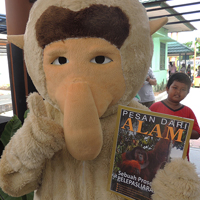News From The Field: Creatures of the Night
Dusk approaches along the banks of the Sekonyer River in Tanjung Puting National Park, the gateway to Camp Leakey. Orangutans have already made their nests and hunkered down for the… Continue reading News From The Field: Creatures of the Night
A Look Back at the History of Iconic Camp Leakey
When Birute Mary Galdikas ventured deep into the heart of Borneo in 1971 as a young graduate student, it was in pursuit of a long sought-after dream – that of… Continue reading A Look Back at the History of Iconic Camp Leakey
The Captivating Flora and Fauna of Tanjung Puting National Park
Tanjung Puting National Park, where Orangutan Foundation International has worked for over 30 years, and its surrounding area is home to a beautiful array of diverse flora and fauna including… Continue reading The Captivating Flora and Fauna of Tanjung Puting National Park
Tanjung Puting National Park Day
On Sunday the 7th of February, 2016 a promotion day was hosted by the Tanjung Puting National Park at Kumai, in the province of Kalimantan Tengah (Central Indonesian Borneo).The… Continue reading Tanjung Puting National Park Day
Analyzing Hydrology in Tanjung Puting’s Peat Swamp Forests
It may seem strange to think of tropical forests and swamps together… but not to orangutans who call peat swamp forests home. The flooded river networks of Tanjung Puting National Park and Lamandau Reserve are key components of forest ecology. Without them, forests and fruit would be distributed differently, and so would orangutans and other species dependent on these unique ecosystem.






